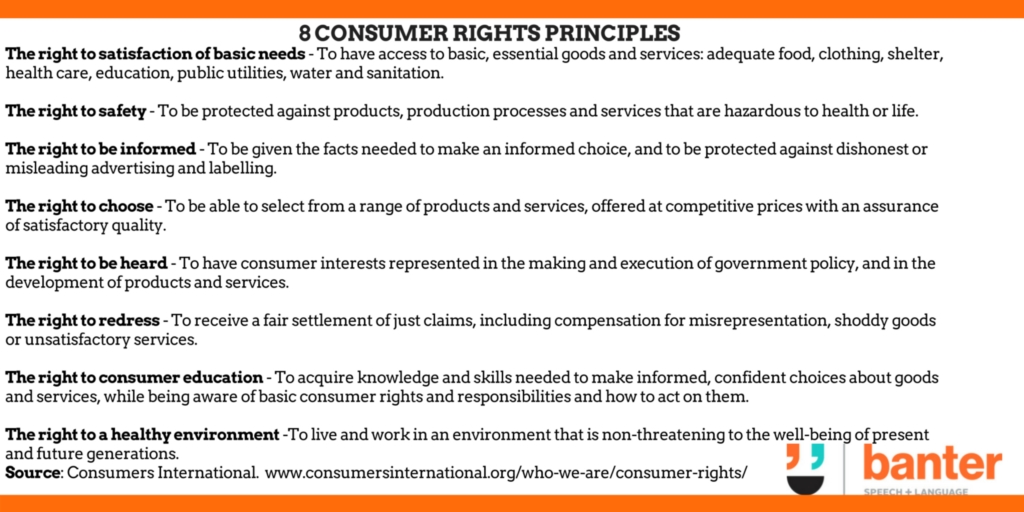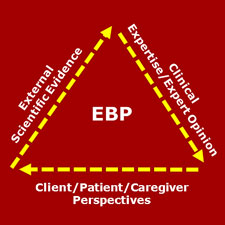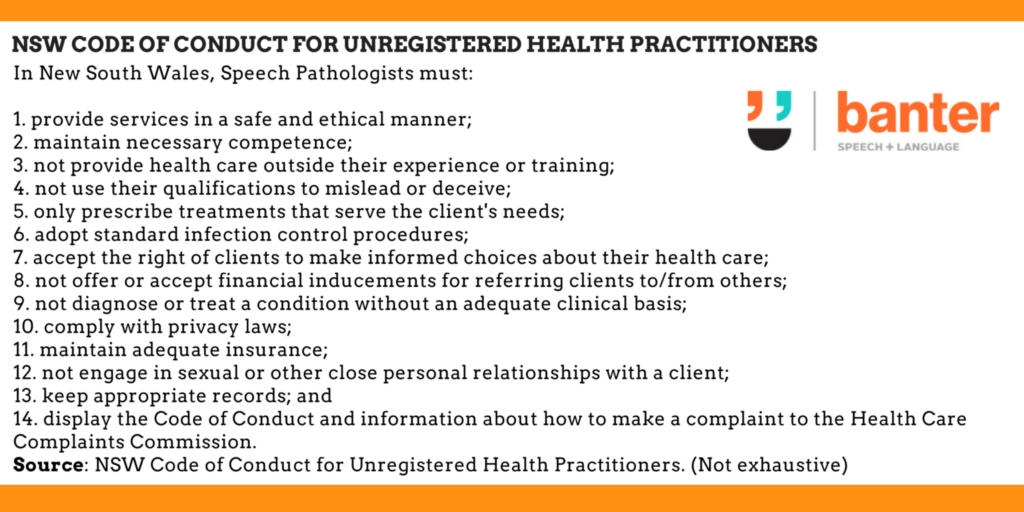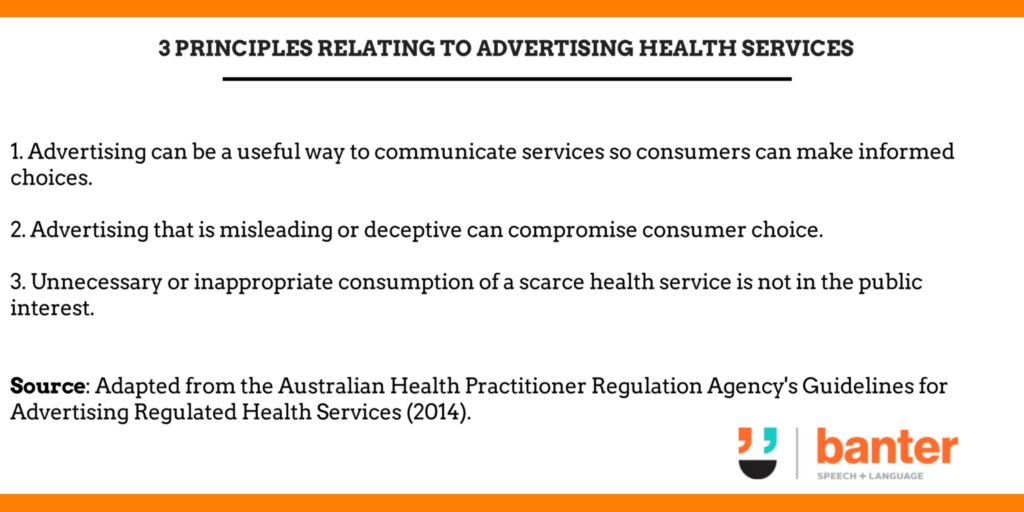Choosing the right speech pathologist can be difficult. You have every right to “shop around” to find someone you trust and feel comfortable with. But, as with many professions, it can be hard to evaluate speech pathologists and to understand different approaches to client care and service.
Last week, I had the opportunity to curate a week of interesting discussion about consumer protections and speech pathology services at @WeSpeechies on Twitter. It made me think about whether I needed to do more to inform clients about their rights and protections.
I’m not for everyone; and I don’t provide every kind of speech pathology service. I am most interested in speech, language, literacy and stuttering therapies for pre-school and school-aged children, as well as adults. I don’t offer feeding or swallowing therapy.
As part of my commitment to transparency, I want our clients (and potential future clients) to understand their rights and our approach to client service when we choose to work together.
Banter Speech & Language operates under the following 11 principles:
1. As a client, you have several consumer rights, which I respect.
2. Speech pathology is an evidence-based profession. I seek to provide you with evidence-based choices.
This means I try to use the current best evidence in helping you to make informed decisions about your health care (Sackett, 1996). To do this, I seek to integrate:
- my clinical expertise (education, clinical experience and skills); with
- your values and preferences (including personal preferences, concerns and expectations); and
- the best research evidence available (preferably from systematic research summarising peer reviewed studies – one reason our blog articles cite research sources) (Sackett, 2002).
This integration is not always easy to do in practice, and I welcome open discussion and shared decision-making. By adopting a philosophy of “evidence-based client choice”, I aim to provide information to you about the evidence to enhance the possibility of shared decision-making (Hope, 2002).
Source: American Speech-Hearing Association (ASHA)
I give you information about the evidence base for specific treatments. For example, I provide evidence-based answers to frequently asked questions, e.g. about childhood apraxia of speech, working memory and auditory processing disorder.
3. I seek to ensure you are fully informed about your options. You are the decision-maker, not me.
(a) If you are an adult, I presume you can make your own decisions unless there is compelling evidence to the contrary (e.g. if a legal guardian or someone else has been appointed formally to make medical decisions for you).
(b) If you are aged 16 or older, I respect your right to make decisions about your health care.
(c) If you are older than 14 and younger than 16, I respect your rights to consent to treatment under the Minors (Property and Contracts) Act 1970 (NSW), although I will also consult with your parents or guardians who also have rights of consent.
(d) To be fully informed about your treatment options, I will outline your options, the nature of each treatment, and the risks and benefits of each option (including what might happen if you have no treatment). I encourage you to ask lots of questions and to ask for more information/evidence underpinning my recommendations if you want or need it. Provided it is ethical for me to do so, I will respect your ultimate decision, even if it does not accord with my own view on the best way forward.
4. You are not your disorder.
We follow a people-first philosophy. That means we see you as a person rather than a “walking diagnosis”. In working with you, we don’t just focus on your “problem” or “issues” or “disorder” or “impairments”.
We look at your strengths and interests. We look at how your communication challenges are getting in the way of your preferred activities, participation in the community, and work and life goals, and work together with you to figure out what we can do to help you overcome obstacles to achieve your potential.
In taking this approach, we are guided by the World Health Organisation’s International Classification of Functioning, Disability and Health (ICF). You can read more about the ICF framework here.
5. As a speech pathologist based in New South Wales, I am subject to a statutory Code of Conduct.
Breaches of this Code gives you the right to lodge complaints with the Health Complaints Commission. You can access the full Code here.
6. As a Certified Practising Speech Pathologist (CPSP), I am committed to continuing professional development.
I am passionate about life-long learning and improving the quality of my services. As a CPSP, I am a member of Speech Pathology Australia (SPA) and must complete a minimum number of hours of additional professional development/training every year to stay up-to-date.
You can read more about what CPSP means via here.
7. As a CPSP and member of SPA, I am also subject to SPA’s:
(a) Code of Ethics.
Amongst other things, the Code of Ethics requires me to be competent and to act professionally; to help you (and not hurt you); to tell the truth; to treat you fairly; to respect your decisions, choices and privacy; and to be courteous and respectful. I need your informed consent to assess and treat you; and I can only treat you if I reasonably expect you to benefit from the treatment. I must communicate with you accurately and in a timely way.
The full SPA Code of Ethics can be accessed here. Breaches of the Code of Ethics can be reported to SPA.
(b) Code of Ethics – Advertising.
With advertising, I stick to the facts and tell the truth. I don’t encourage unnecessary use of my service with promotions, vouchers, competitions or the like.
I do not publish client testimonials for the simple reason that they are manipulative and can unduly influence vulnerable people with health needs.
Currently, members of SPA are not allowed to call ourselves “experts” or “specialists”. To help clients make decisions, we support the introduction of an objective and transparent accreditation scheme to recognise speech pathologists with expertise, experience and specialist training.
8. As a professional, I am transparent with you in respect of my fees and dealings with other health professionals.
(a) I am upfront about my fees – I disclose the cost of my services up-front and give you notice of price changes. I don’t publish price lists on my website as I do not want to send price signals to other speech pathologists, which could result in uncompetitive (and illegal) price-fixing. I do not discuss my fees with any of my competitors for the same reason. We are a “for profit” business and my fees are calculated by reference to my clinic business model, including our evolving cost structure.
(b) I operate my clinic independently. I do not have any agreements or other understandings with other health professionals about “territories” or cross-referrals. I do not pay or accept payment or other inducements for referrals.
9. I respect your privacy.
As outlined in our Privacy Policy, we are committed to protecting your privacy and the confidentiality of your health records in accordance with Commonwealth and State laws.
10. I expect you to be honest with me, come to your appointments and to complete home exercises.
To assess and treat you properly, I need to know all the relevant facts – including whether you are seeking a second opinion or a report for litigation purposes. I can’t assess your needs properly without all the relevant background and facts. But, of course, I understand you may want to meet and get to know me face-to-face before sharing particularly sensitive information.
We work hard to prepare for your therapy sessions and have a waiting list of clients who we do not currently have the capacity to see. To ensure we can help you and as many others as practical, we expect you to respect us by being open with us about your needs, coming to your appointments and doing the work we assign to help you achieve your goals efficiently. These expectations are outlined in our booking and cancellation policy, which forms part of our terms when you book an appointment.
11. If you are unhappy with our service, you have a right to complain.
We encourage open and frank discussions and continuous feedback. Your feedback plays a vital role in helping us to to improve our services.
You have a right to complain. Your treatment will never be compromised because you exercise this right. If you are unhappy with any aspect of your care with us, please let me know immediately so we can work together to address the issue to your satisfaction.
If we are unable to resolve the issue, you may have rights to lodge a complaint with SPA or the Health Care Complaints Commission.

Hi there, I’m David Kinnane.
Principal Speech Pathologist, Banter Speech & Language
Our talented team of certified practising speech pathologists provide unhurried, personalised and evidence-based speech pathology care to children and adults in the Inner West of Sydney and beyond, both in our clinic and via telehealth.






Leave a Reply